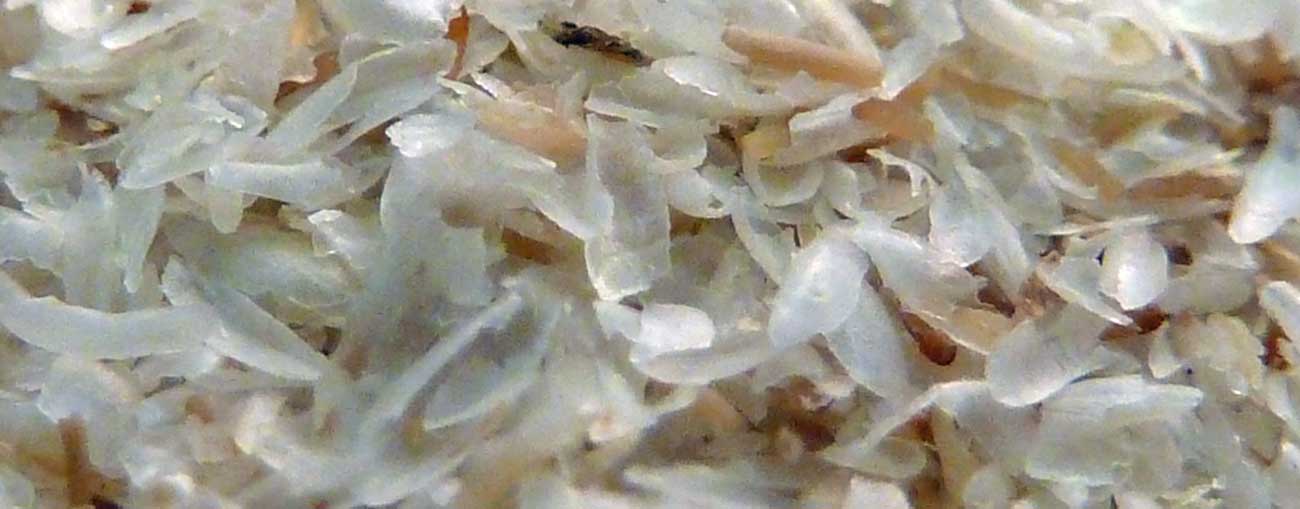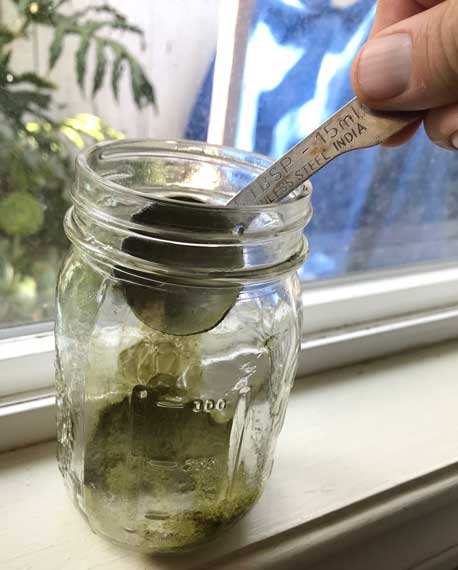updated: 11-08-2022
Background on psyllium husks
Psyllium husks are the dry outer covering of seeds from the Blond Psyllium plant (Plantago ovata). Psyllium is native to Southern Asia and grows naturally in sandy and silty soils. Currently, 85% of the world supply of psyllium is grown in India, while the United States is the largest importer. The husk, or seed covering material, is separated from the plant, dried, chopped up, packaged into capsules and sold as a source of soluble dietary fiber.
Like all fiber, psyllium husk fiber is indigestible but by passing through our digestive system, this fiber helps us in regards to cholesterol, digestion and possibly diabetes.
In this article, we review the biology behind psyllium husk benefits. At the end of the page, we discuss factors involved when choosing a psyllium supplement.

photo: Bastique, CC BY-SA 3.0, via Wikimedia Commons
Seed husks from Plantago ovata are the source of psyllium husk fiber.
Psyllium husk fiber
Psyllium husk is used as an easy way to add soluble fiber to your diet. By consuming proper levels of soluble fiber you help maintain the regular transit of food through your digestive system. The Institute of Medicine recommends men eat 30-38 grams of fiber per day and women consume 21-25 grams (U.S.NIH). Beans, fruit, oats and barley all offer good amounts of fiber. But, from my experience, it’s quite a challenge to get 30 grams of fiber a day solely from these sources. To reach the recommended daily intake, its helpful to combine your natural diet with a soluble fiber supplement like psyllium husk fiber.
Psyllium husks, like other forms of soluble fiber, soak up water in your gut, which makes your stool softer and easier to pass. In this regard, psyllium helps people dealing with constipation, irritable bowel syndrome, hemorrhoids or diarrhea (Jenkins, 2002).
Additionally, unlike beans, you can get your daily fiber from psyllium without the unpleasant side effect of flatulence.
Psyllium husk for cholesterol
Eating fiber also seems to help manage cholesterol levels (Pereira, 2004). Soluble fiber has demonstrated the ability to lower LDL, an abbreviation for low density lipoproteins (Brown, 1999; Pereira, 2000). In the world of cholesterol, LDL is the bad cholesterol; it’s the one you do not want. LDL can collect along blood vessel walls, cause artery blockage and ultimately put you at greater risk of a heart attack.
Research suggests that taking psyllium husk daily can reduce LDL cholesterol levels (Brown, 1999; Anderson, 2000; Olson, 1997). One particular report shows that consuming 10 grams of psyllium daily can reduce LDL levels by 7%, without changing HDL levels (Anderson, 2000). Furthermore, if you combine psyllium with your prescribed cholesterol medication, such as a statin, you may find you can lower your statin dosage and still experience the same LDL reduction (Moreyra, 2005).
Psyllium husk benefits for diabetes
Diabetes is a global epidemic…and it’s getting worse. As of 2015, 415 million people suffer from diabetes. This staggering number represents 8.3% of the adult population of the world. By 2035, its predicted that just under 10% of the world population will suffer from diabetes. It should be noted that Type 2 diabetes accounts for approximately 90% of current cases. Type 2 involves the failure of insulin to properly regulate sugar in our blood. The primary cause of Type 2 diabetes is insufficient exercise and obesity.
A recent report (Gibb, 2015) suggests that eating psyllium husk fiber helps control our blood sugar levels. Gibb et al. performed an analysis of 35 controlled, clinical studies. The authors conclude that psyllium husks helps manage glycemic control (blood sugar levels) in a manner that is commensurate with loss of glycemic control. This means that the greatest benefit was seen in people that were either suffering from Type 2 diabetes, or were in a ‘pre-diabetes’ state. In the future, it will be interesting to see if psyllium husk fiber is recommended for diabetes prevention. If you are suffering from diabetes and are currently on diabetes medication, make sure to consult your physician before taking psyllium husks.
Factors to consider when choosing a psyllium husk supplement
Your brand of psyllium should list their main ingredient as Plantago ovato and provide an amount (mg.) per capsule. We prefer companies with manufacturing locations in the U.S., as we’re more familiar with the U.S. current good manufacturing processes (cGMP).
Psyllium husk dosage
Recommended daily dosage will vary based on age, gender and diet. In general, to achieve the full benefits of soluble fiber, an adult should combine a healthy diet with approximately 6-7 grams of psyllium husk.
Psyllium husk capsules vs powder
Capsules are convenient for traveling. When I fly, I get funny looks from the TSA officials as they inspect my bag of loose psyllium powder. But keep in mind, most psyllium capsules are in the 0.5 gram amount, therefore a reasonable intake would be 4-6 capsules twice daily. Consult with your physician for more insight towards dosage. Either way, that’s a lot of capsules to swallow. When I’m home, I prefer mixing the powder in water. Also avoid psyllium capsules if you’ve ever had esophageal narrowing issues or an allergic response to psyllium. Aside from these preferences, there is no meaningful difference between psyllium husk capsules vs powder.
Important: Take psyllium capsules or powder with at least 1 full glass of water (8 oz.). Without sufficient water, the fiber may swell in the throat and cause problems.
Our psyllium husk review…
Solaray Psyllium Capsules and Whole Husk
Solaray is a reputable U.S. company, based in Utah. They package a 1/2 gram (525 mg.) of psyllium husk in each capsule (this is less than most brands package). This is a benefit for young adults or people who want the option of ingesting less fiber per capsule. We like Solaray because they test each of their supplements using multiple bio-markers. This ensures the presence and purity of psyllium in each bottle. Additionally, Solaray has applied their Green Screened logo to their psyllium bottles. The Green Screened logo lets customers know that the psyllium in each capsule has been tested for microbes, heavy metals, herbicides and pesticides.
The use of psyllium has recently become popular for gluten-free cooking. This is because the psyllium husk keeps gluten-free baked goods moist. For cooking, the preference is for whole psyllium husk as opposed to the powdered form or capsule.
Metamucil Psyllium Husk Powder, Orange Flavored Drink
Metamucil is certainly the most recognized fiber supplement brand. This company has been selling fiber for 81 years, since 1934. The active ingredient in their fiber supplements is psyllium seed husks (Plantago ovato). You can purchase capsules packed with fiber or you can try these powder drink packets.
There’s a few different flavors, orange is historically the most popular. If you want to keep sugar from your diet, they do offer a sugar-free mix.
One more thing…
For the past three years, we’ve been drinking a green plant powder mix that combines high fiber and lots of superfood nutrients.
The fiber part curbs the appetite throughout the day.
The superfood, green plant powder part fills the body with vitamins, minerals, digestive enzymes, antioxidants and other phyto-nutrients.
Most importantly, this drink is for people who don’t want to spend too much time preparing healthy foods.
For this green powder concoction, we just add powder to water, stir and drink!
At EthnoHerbalist we only discuss the most effective medicinal plants. Please read our other herbal supplement reviews…
Citations
Anderson JW, Allgood LD; Lawrence A. et al. “Cholesterol-lowering effects of psyllium intake adjunctive to diet therapy in men and women with hypercholesterolemia: meta-analysis of 8 controlled trials”. Am J Clin Nutr 2000;71472- 479.
Brown L; Rosner B; Willett W; Sacks F. “Cholesterol-lowering effects of dietary fiber: a meta-analysis”. Am J Clin Nutr 1999; 6930- 42.
Gibb, Roger D., et al. “Psyllium husks fiber improves glycemic control proportional to loss of glycemic control: a meta-analysis of data in euglycemic subjects, patients at risk of type 2 diabetes mellitus, and patients being treated for type 2 diabetes mellitus.” The American journal of clinical nutrition 102.6 (2015): 1604-1614.
Jalanka, Jonna, et al. “The Effect of Psyllium Husk capsules vs powder on Intestinal Microbiota in Constipated Patients and Healthy Controls.” International journal of molecular sciences 20.2 (2019): 433.
Jenkins DJA, Kendall CWC, Vuksan V. et al. “Soluble fiber intake at a dose approved by the US Food and Drug Administration for a claim of health benefits: serum lipid risk factors for cardiovascular disease assessed in a randomized controlled crossover trial”. Am J Clin Nutr. 2002; 75834- 839.
Moreyra, A, Wilson, AC. et al. “Effect of combining psyllium husk dosage fiber with simvastatin in lowering cholesterol”. JAMA Internal Medicine. 2004; 165(10):1161-1166.
Olsen BH, Anderson SM, Becker MP. et al. “Psyllium husk fiber enriched cereals lower blood total cholesterol and LDL cholesterol, but not HDL cholesterol. Psyllium husk benefits in hypercholesterolemic adults: results from a meta-analysis”. J Nutr. 1997;1271973- 1980.
Pereira MA, Pins JJ. “Dietary fiber and cardiovascular disease: experimental and epidemiologic advances”. Curr Atheroscler Rep. 2000;2494- 502.
Pereira MA, O’Reilly E. et al. “Dietary Fiber and Risk of Coronary Heart Disease: A Pooled Analysis of Cohort Studies”. JAMA Internal Medicine. 2004;164(4):370-376.

